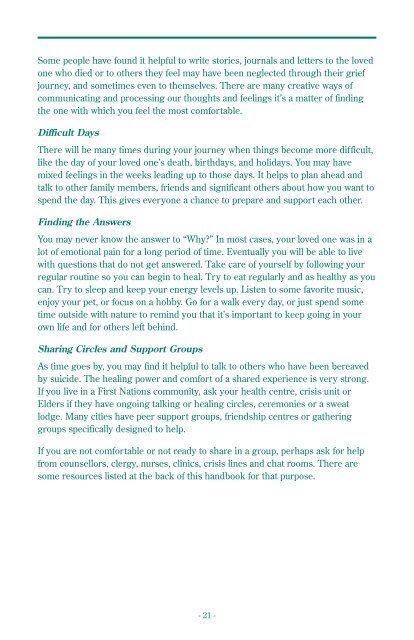After a Suicide - Practical Personal Guide for Survivors
After a Suicide - Practical Personal Guide for Survivors
After a Suicide - Practical Personal Guide for Survivors
Create successful ePaper yourself
Turn your PDF publications into a flip-book with our unique Google optimized e-Paper software.
Some people have found it helpful to write stories, journals and letters to the loved<br />
one who died or to others they feel may have been neglected through their grief<br />
journey, and sometimes even to themselves. There are many creative ways of<br />
communicating and processing our thoughts and feelings it’s a matter of finding<br />
the one with which you feel the most com<strong>for</strong>table.<br />
Difficult Days<br />
There will be many times during your journey when things become more difficult,<br />
like the day of your loved one’s death, birthdays, and holidays. You may have<br />
mixed feelings in the weeks leading up to those days. It helps to plan ahead and<br />
talk to other family members, friends and significant others about how you want to<br />
spend the day. This gives everyone a chance to prepare and support each other.<br />
Finding the Answers<br />
You may never know the answer to “Why?” In most cases, your loved one was in a<br />
lot of emotional pain <strong>for</strong> a long period of time. Eventually you will be able to live<br />
with questions that do not get answered. Take care of yourself by following your<br />
regular routine so you can begin to heal. Try to eat regularly and as healthy as you<br />
can. Try to sleep and keep your energy levels up. Listen to some favorite music,<br />
enjoy your pet, or focus on a hobby. Go <strong>for</strong> a walk every day, or just spend some<br />
time outside with nature to remind you that it’s important to keep going in your<br />
own life and <strong>for</strong> others left behind.<br />
Sharing Circles and Support Groups<br />
As time goes by, you may find it helpful to talk to others who have been bereaved<br />
by suicide. The healing power and com<strong>for</strong>t of a shared experience is very strong.<br />
If you live in a First Nations community, ask your health centre, crisis unit or<br />
Elders if they have ongoing talking or healing circles, ceremonies or a sweat<br />
lodge. Many cities have peer support groups, friendship centres or gathering<br />
groups specifically designed to help.<br />
If you are not com<strong>for</strong>table or not ready to share in a group, perhaps ask <strong>for</strong> help<br />
from counsellors, clergy, nurses, clinics, crisis lines and chat rooms. There are<br />
some resources listed at the back of this handbook <strong>for</strong> that purpose.<br />
- 21 -



